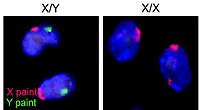| Part of a series on |
| Sex |
|---|
 |
| Biological terms |
| Sexual reproduction |
| Sexuality |
| Sexual system |
Sex chromosomes (also referred to as allosomes, heterotypical chromosome, gonosomes, heterochromosomes,[1][2] or idiochromosomes[1]) are chromosomes that carry the genes that determine the sex of an individual. The human sex chromosomes are a typical pair of mammal allosomes. They differ from autosomes in form, size, and behavior. Whereas autosomes occur in homologous pairs whose members have the same form in a diploid cell, members of an allosome pair may differ from one another.
Nettie Stevens and Edmund Beecher Wilson both independently discovered sex chromosomes in 1905. However, Stevens is credited for discovering them earlier than Wilson.[3]
- ^ a b "Allosome - Biology-Online Dictionary". www.biology-online.org. Archived from the original on 2018-02-11. Retrieved 2018-02-22.
- ^ "the definition of allosome". Dictionary.com. Archived from the original on 2016-02-04. Retrieved 2018-02-22.
- ^ Brush SG (June 1978). "Nettie M. Stevens and the discovery of sex determination by chromosomes". Isis. 69 (247): 163–172. doi:10.1086/352001. JSTOR 230427. PMID 389882. S2CID 1919033.